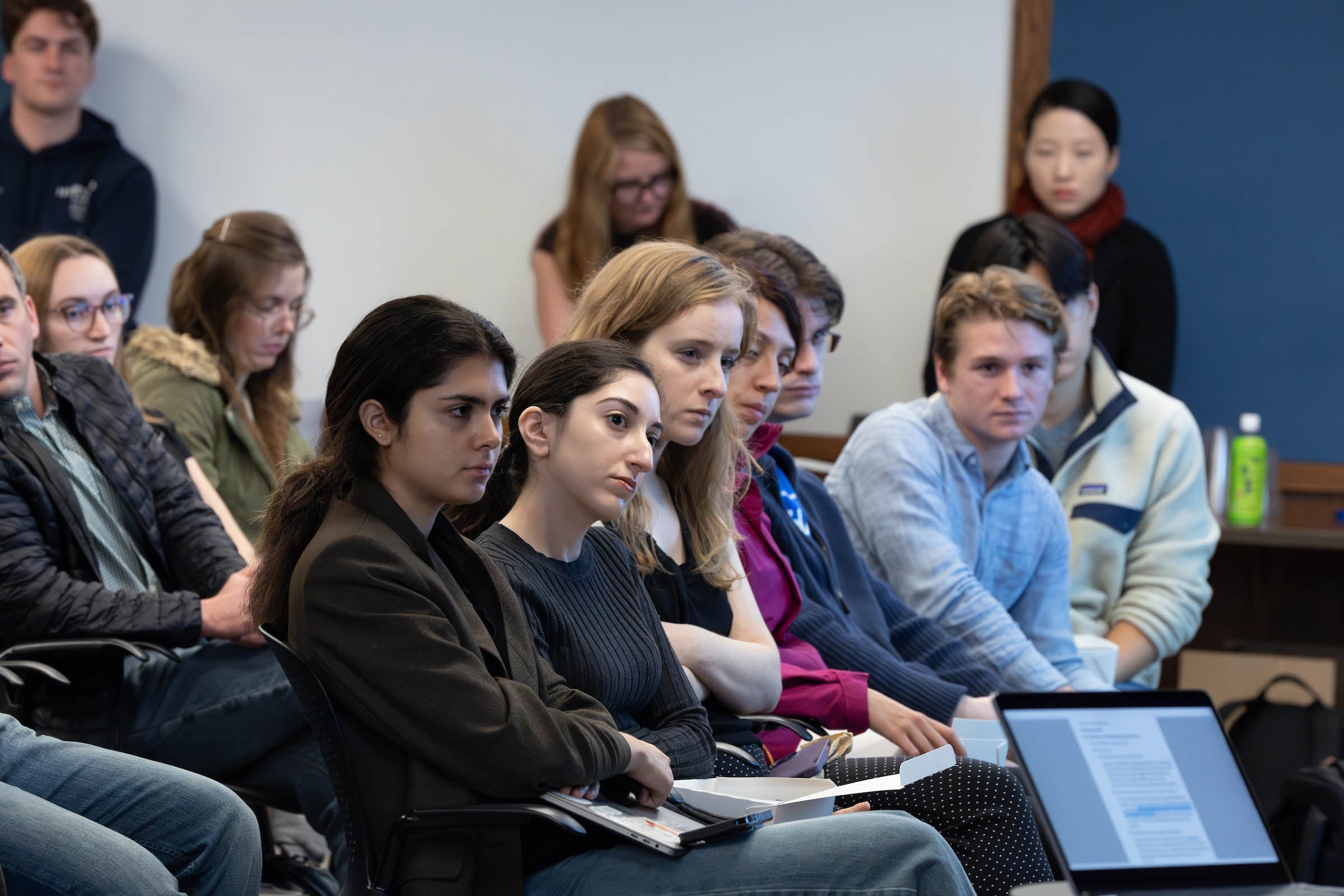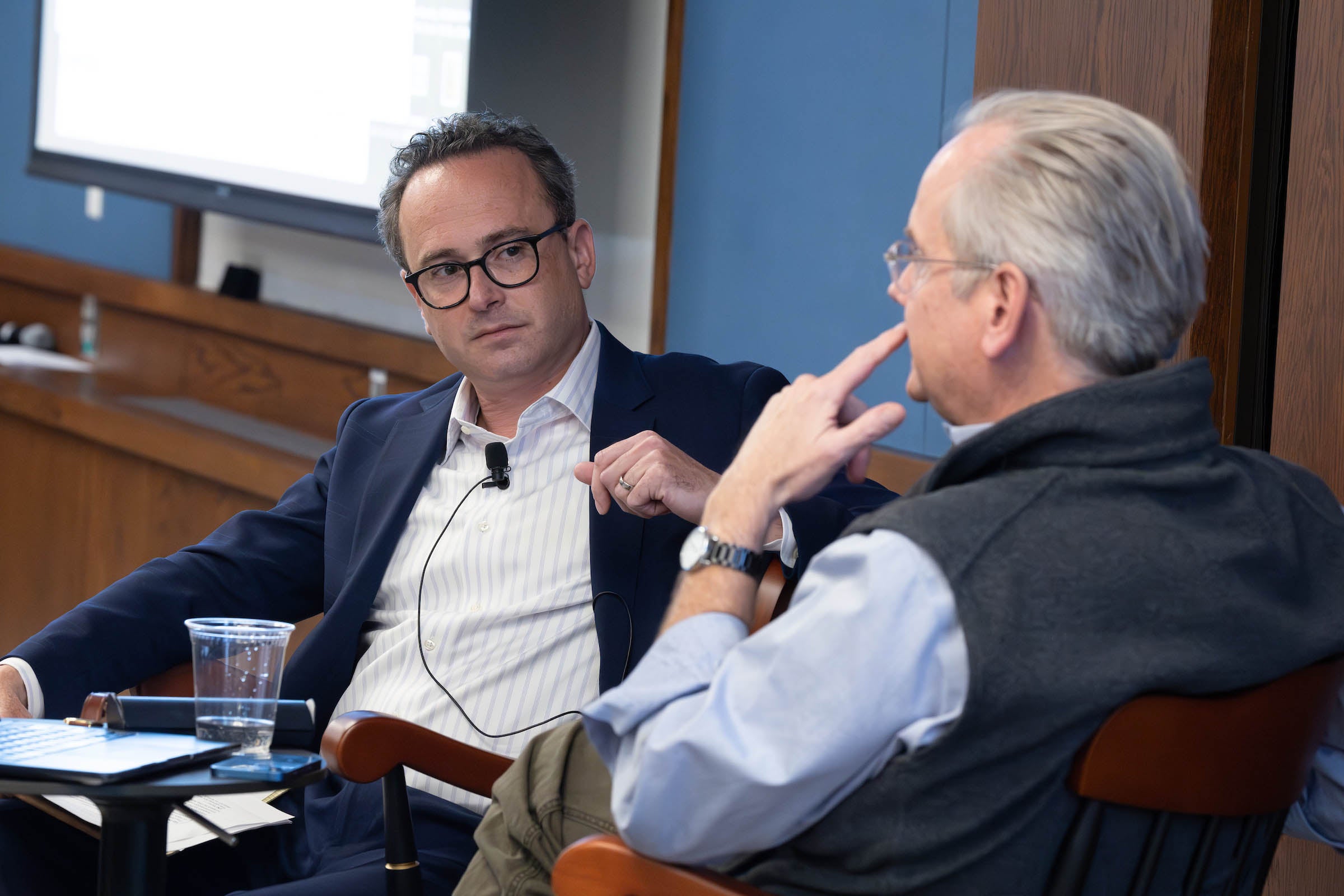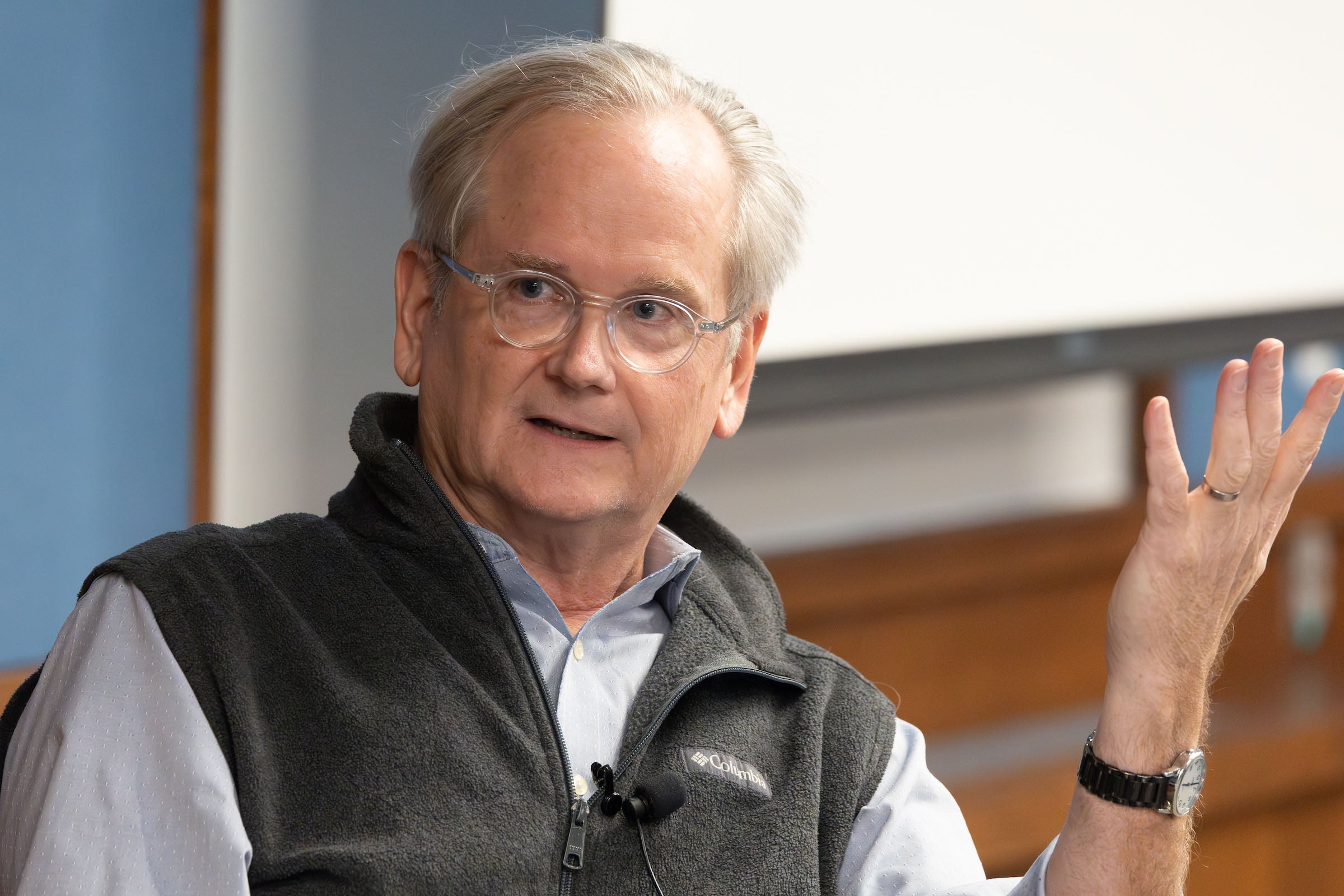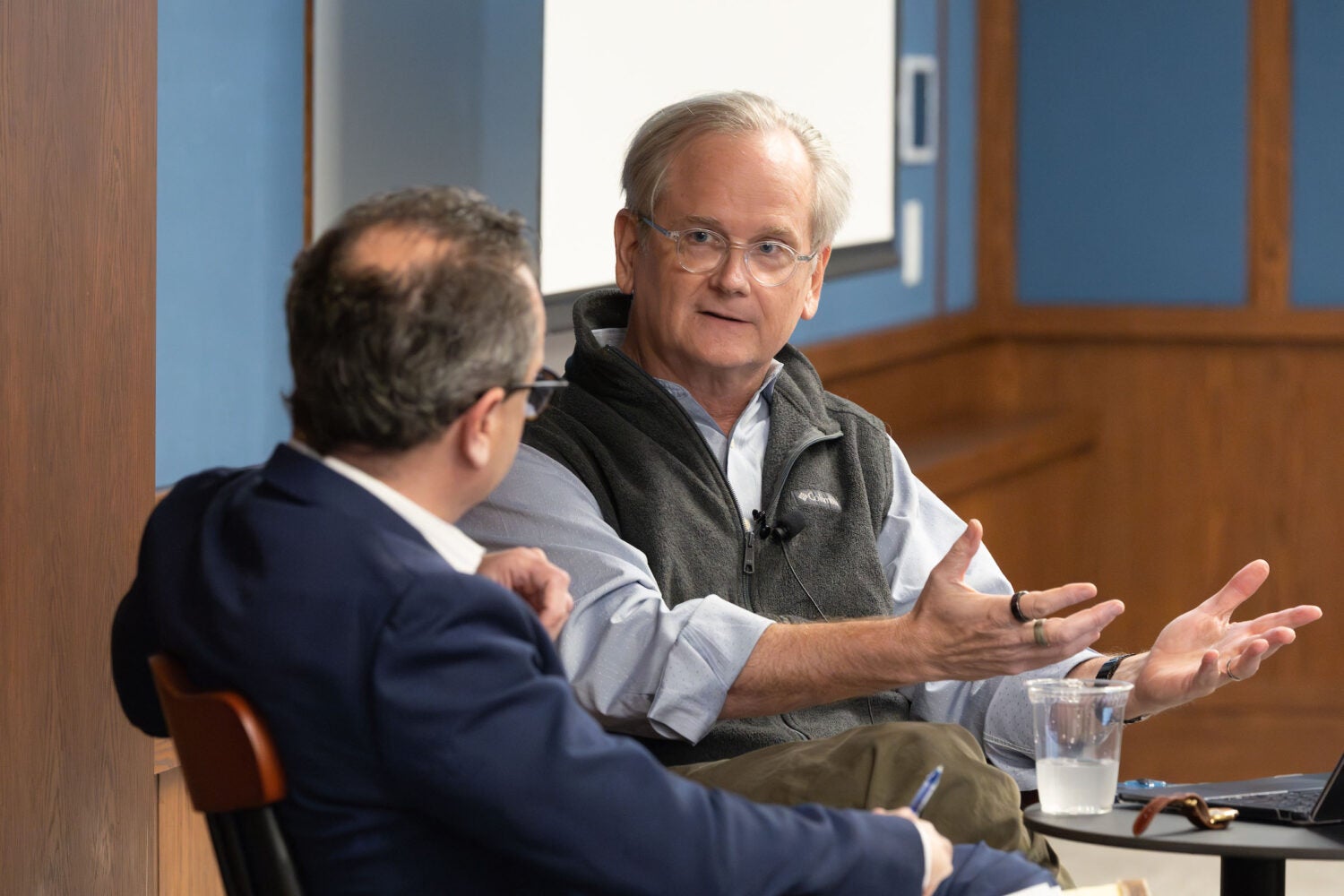In 2020, the last presidential election year, Harvard Law School Professor Lawrence Lessig co-taught a course in which students outlined possible ways to manipulate the Electoral College and flip the voting results. On Jan. 5, 2021 — after the election and a flurry of baseless and unsuccessful legal challenges from the losing Trump campaign — Lessig thought the nation had “dodged all the bullets” that his students had revealed to be pointing directly at the democratic system.
“That’s because nobody had on their bucket list the idea of charging the Capitol on January 6,” Lessig, the Roy L. Furman Professor of Law and Leadership, said wryly in How to Protect a Presidential Election, a wide-ranging conversation with Professor of Practice Larry Schwartztol, faculty director of the Democracy and the Rule of Law Clinic, at Harvard Law School on Oct. 30.
But even more significant — and legally plausible — threats to U.S. presidential elections remain, Lessig went on to say at the event, which was hosted by the HLS Beyond program. Lessig and Matthew Seligman, a former Harvard Law School lecturer who co-taught the 2020 class, describe those threats in their book, “How to Steal a Presidential Election,” which was published in February.
Despite the provocative title — Schwartztol began the conversation by suggesting he isn’t the only person who heard about the book and thought “Don’t tell them how!” — Lessig said his intention is to motivate people to fix the vulnerabilities that he, Seligman, and their students uncovered in the class, Presidential Elections: War Gaming 2020, which Jason Harrow ’11 also co-taught.
“What motivated us was the recognition that the [relevant] laws were extremely complicated and badly structured, but in a world of good-faith actors that didn’t matter much. People would muddle through to get to the right answer,” Lessig said. “But in a world where you couldn’t count on good-faith actors, it matters a lot. So, we needed to think about how to improve the law.”

‘Unforced Error’
Ironically, one of the vulnerabilities Lessig is most concerned about stems from an effort to do just that.
In 2022, Congress passed the Electoral Count Reform and Presidential Transition Improvement Act. Designed to address some of the confusion and misinformation about the process of casting and counting votes, the law says that the vice president’s role is merely “ministerial,” intended to tally electoral votes. (Lessig and Schwartztol agreed that was already clear under the Constitution, but on Jan. 6, 2021, Trump and his supporters contended otherwise).
More significant changes in the law address the role of electors. But, according to Lessig, Congress made a “completely unforced error” that creates an opening for bad-faith actors to try to subvert election results by, for instance, delaying a recount past the deadline for electoral votes or falsely declaring election results fraudulent and unilaterally directing electors to vote another way.
As an example, Lessig cited the 1960 presidential election in Hawaii. Candidate Richard Nixon was originally declared the winner in the newly admitted state, but a recount was called. In the meantime, electors for both John F. Kennedy and Nixon cast their ballots by the relevant deadline. After the recount, Kennedy was declared the winner, and, on Jan. 6, 1961, Nixon — in his role as vice president — counted the Kennedy electors’ votes, not his own.
Under the language of the reformed law, Lessig believes the Hawaii precedent of sending two sets of electoral votes to Congress would not be possible. In other words, Hawaii’s electoral votes would have gone to Nixon.
“My view is that [the new law] created a deep instability in the system,” he said.

Protecting the Vote
Lessig and Schwartztol are both intimately familiar with the threats facing American democracy. Before joining Harvard Law School as a full-time faculty member in 2022, Schwartztol served in the Biden administration as associate White House counsel and special assistant to the president working on voting rights issues. Prior to that, he was an attorney at Protect Democracy, where, among other efforts, he helped ensure the 2020 vote was properly certified.
In recent years, Lessig, a leading scholar on law and technology, has turned his attention to “institutional corruption,” or processes that, although technically legal, weaken public trust.
He briefly ran for president in 2016 on a platform based solely on campaign finance and electoral reform. After dropping out of the race, he founded Equal Citizens, a non-profit and non-partisan organization that seeks, among other things, to reform the Electoral College. In 2018, the organization sued California and Massachusetts (on behalf of Republican and third-party voters) as well as Texas and South Carolina (on behalf of Democratic and third-party voters), arguing that the winner-take-all method those states use to award Electoral College votes violated his clients’ constitutional rights. (Lessig is in favor of a proportional allotment of electoral votes based on the results of the election in each state. Equal Citizens also supports the idea of states awarding their Electoral College votes to the candidate who wins the national popular vote).

After the 2016 presidential election, Lessig and Harrow, Equal Citizens’ former chief counsel and executive director, unsuccessfully represented so-called “faithless electors” who abandoned their pledges to vote for the winner of their states’ popular votes, Hillary Clinton. The case, Chiafalo v. Washington, resulted in a unanimous decision from the U.S. Supreme Court that a state may enforce its electors’ pledge to support voters’ choice for president. That ruling created one of the vulnerabilities Lessig and Seligman describe in their book. As the pair wrote in The New York Times in January, state legislatures could pass laws requiring electors to vote as they direct them to, regardless of the results of the election.
“There are no protections against a state legislature simply ordering whichever electors are appointed to vote for the candidate that the legislature, and not the people of the state, choose,” the authors wrote.
‘Novel, Hard Legal Questions’
In 1960, Hawaii’s electoral votes weren’t really a major factor. Even if they had been awarded to Nixon, Kennedy still would have won. Today, the country is much more divided, and questions about centuries-old democratic processes are hotly debated.
Lessig and Schwartztol’s event was standing-room only. “There’s an election coming up, I heard,” Schwartztol joked.
The pair discussed the intricacies and ambiguities of the Electoral Count Reform and Presidential Transition Improvement Act for about 45 minutes before taking questions from students and others. They agreed, as Schwartztol put it, that the law raises “novel, hard legal questions that are so consequential and that might be decided on an incredibly compressed timeline.”
Throughout the discussion, however, Schwartztol took a slightly more optimistic view than Lessig, suggesting that provisions in the law for expedited federal judicial review make it possible to resolve questions about elector votes before they are counted by Congress next Jan. 6.
“If I’m putting myself in the position of a would-be election subverter, I don’t think there’s a straight line about how to do it,” he said. Still, he agreed, “I worry a lot about post-election disputes that might land in this territory.”
Want to stay up to date with Harvard Law Today? Sign up for our weekly newsletter.
